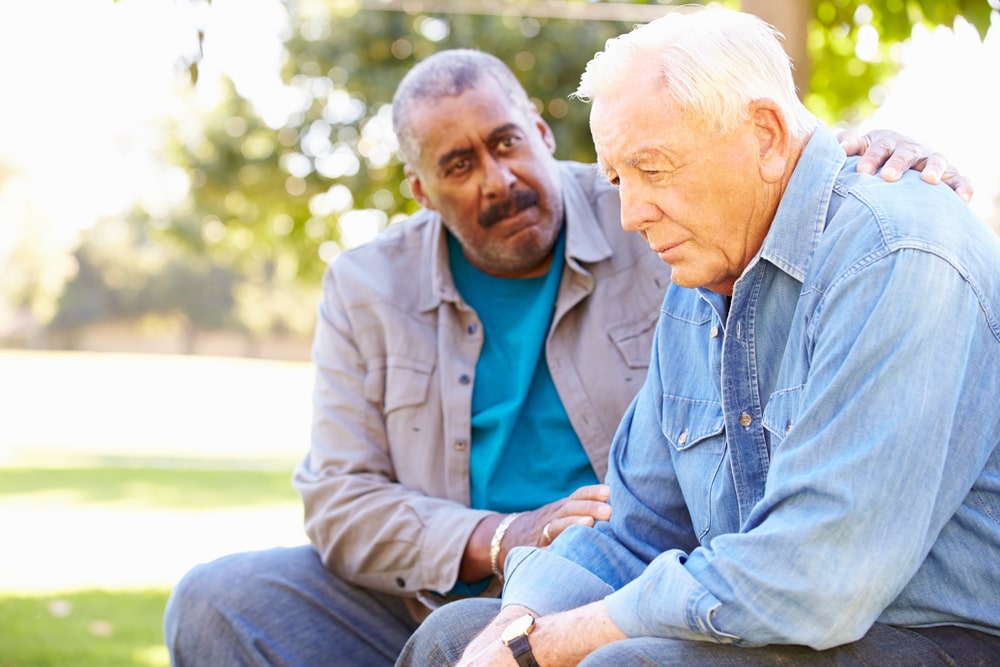When a friend is hurting, it’s hard to know what to do. We want to offer words of comfort and support, but we worry that we’ll say the wrong thing. Or do the wrong thing. Above all, we wish we had the magic words to erase our friend’s grief and make them whole again.
But it’s important to remember, even as we work to support our friends who are mourning, that we mustn’t rob them of the process of grief. Dr. Alan Wolfelt, a respected grief counselor and author, says that we never “get over” our grief. Instead, we become reconciled to it; we learn how to weave the loss into the story of our lives. He goes on to say:
“You don’t get to go around or above your grief. You must go through it. And while you are going through it, you must express it if you are to reconcile yourself to it. …As you achieve reconciliation, the sharp, ever-present pain of grief will give rise to a renewed sense of meaning and purpose.”
As you seek to help a friend in grief, above all, allow them the necessity of the grief journey. We must face our grief in order to accept our loss.
7 Tips for Helping a Grieving Friend
1. Actively Listen
As you listen to a grieving friend, you may hear them saying similar things again and again. Don’t worry – this is normal. Dr. Wolfelt says that “repetition is part of the healing process.” As human beings, we need a safe place to relive our memories and talk about our loved one so that we can face our loss and begin to move forward. So, give your friend time and room to express themselves without fear of criticism or judgment. Listen as carefully and compassionately the first time as the fiftieth time.
2. Express Compassion and Empathy
While you may not know exactly what words to say, expressing compassion and empathy is important. Acknowledge the very real reality of your friend’s pain and loss. Your friend doesn’t need you to offer advice or fall back on clichés. Instead, agree that their pain is real and legitimate and that your heart hurts because their heart hurts.

3. Prepare for an Emotional Roller Coaster
Grief elicits a wide range of emotions. Maybe you’re familiar with a few of them from your own grief journey: sadness, anger, relief, regret, guilt, or blame, to name a few. Because every grief journey is different, there’s no way to know for sure how your friend is going to react emotionally. So, be prepared for anything.
When the emotions break through, accept them for what they are. Say nothing to make your friend feel like their emotions are wrong or incorrect. Instead, to show them that you love and support them, listen to them and let them work through the emotions of their grief. If asked, and only if asked, offer loving guidance.

4. Offer Practical and Specific Help
When a friend loses someone, you might wonder what you can do. As human beings, our first reaction is often to try to fix something or find a way to make it better. With grief, you can’t just fix it – people have to work through their grief on their own. But you can offer practical and specific help to a grieving friend to make the grief journey a little easier.
Here are some practical ideas:
- Offer to babysit or pick the kids up from school
- Help out around the house (e.g. repairs, laundry, cleaning, etc.)
- Meal prep (e.g. grocery shopping, dropping off dinner, starting a care calendar)
- Get them out of the house (e.g. walks, lunch, movie night)
- Run errands
- Help with funeral arrangements
- Look after the pets
- If they recently lost a spouse, offer to stay the night so they don’t feel alone
When offering practical help, take the initiative on yourself. A grieving person is unlikely to call you for help. Instead, offer a specific time and let them contradict you. For example, “Can I come by on Tuesday to mow the lawn for you?” They may turn your offer down at first, but then you can ask, “What day is better? I’d really like to do this for you.”

5. Give the Gift of Your Presence
You may be worried that you’re going to say the wrong thing at the wrong time, but don’t let that stop you from giving the gift of your presence. Your friend needs your unswerving support, minus opinions and advice (unless they ask for it). Be willing to witness their pain and realize that there may be times when they don’t appreciate your efforts. Don’t take their reaction personally – grief brings out a multitude of emotions, some kind and some not. If you stick with your friend through the ups and downs, offering your steadfast presence in their life, you will eventually receive an indescribable gift. You will see them come through the pain and find a new normal.

6. Provide Ongoing Support
After the funeral, many of us forget to check on our grieving friends. We mistakenly think that the funeral brings complete closure, and everything is over and done. But that’s not the case. The funeral is only the first step in the grief journey, so it’s important to continue offering support and encouragement after the funeral concludes.
You might send notes and texts or call and leave an encouraging voicemail, especially on special days like anniversaries or birthdays. You don’t have to say much. Even a simple, “I’m thinking about you” can brighten someone’s day and let them know you care.

7. If Needed, Lovingly Suggest Grief Counseling
While there is no time frame for grief, it is important to monitor how your friend is doing. If months have passed, and they have not seemed to move toward healing, consider whether you should lovingly suggest professional help or a grief support group. Again, there’s no need to push too hard. Just let them know you are concerned about them and want what’s best for them.






